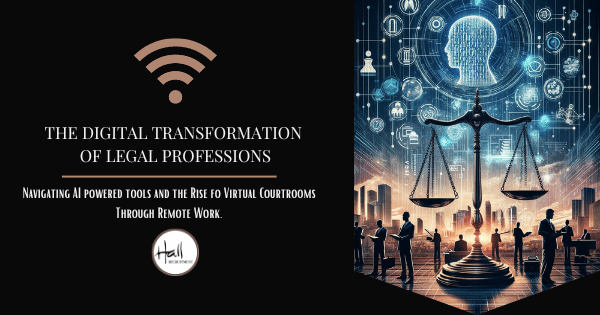Navigating AI powered tools and the Rise fo Virtual Courtrooms Through Remote Work.

- Navigating AI powered tools and the Rise fo Virtual Courtrooms Through Remote Work.
- “In the Future, Everyone Will Be World-Famous for 15 Minutes” – The Digital Transformation of Legal Professions
- “The Times They Are A-Changin'” – Adapting to Technological Shifts
- “I Know Kung Fu” – Mastering New Skills for Future Recruitment
- “There’s No Place Like Home” – The Remote Revolution and Legal Recruitment
- “The Great Leap Forward” – Embracing the Future
- “No Fate But What We Make” – Conclusion
“In the Future, Everyone Will Be World-Famous for 15 Minutes” – The Digital Transformation of Legal Professions
In a world where Andy Warhol’s prophetic vision of fleeting fame has collided head-on with the digital age, the legal profession finds itself at a unique crossroads. No longer confined to the hallowed halls of courtrooms and law libraries, the impact of technology has irrevocably altered the landscape for legal professionals. This change, both seismic and subtle, prompts a dual examination: the present challenges and the future trends in legal recruitment.
“The Times They Are A-Changin'” – Adapting to Technological Shifts
Today, the legal profession grapples with a technological evolution that has both democratized and complicated access to legal information. Online databases, AI-powered legal research tools, and virtual courtrooms have transformed the way lawyers conduct their work. This digital revolution has not only increased efficiency but also raised the bar for legal practitioners’ required technical proficiency. The modern lawyer must now be as comfortable behind a screen as they are with the law books, navigating digital landscapes with the same ease as legal precedents.
I’m sure we all remember the case in 2023 where a New York federal judge sanctioned lawyers who submitted a legal brief written by AI tool ChatGPT, which included citations of non-existent court cases.
If not refresh your memory by clicking this link.
This is a prime example of a situation where someone has not fully understood the limitations of this particular AI tool and as a result will be the butt of jokes for years to come.
The rise in remote work, amplified by economic factors such as the increasing cost of living and the changing dynamics of workplace expectations, further emphasizes the need for adaptability among legal professionals. As younger generations delay traditional milestones like home ownership due to economic pressures, their expectations from employers also evolve, demanding flexibility and work-life balance that the legal profession has historically struggled to provide.
“I Know Kung Fu” – Mastering New Skills for Future Recruitment
As we pivot to the future, the recruitment of legal professionals will increasingly focus on a blend of traditional legal acumen and technological prowess. The days of solely valuing experience over skill are waning. Future legal recruitment will prioritize candidates who are not just legal experts but also tech-savvy innovators capable of leveraging technology to streamline legal processes and enhance accessibility to legal services.
This shift necessitates a new approach to legal education and training, one that embeds technological competency alongside jurisprudence. Moreover, the recruitment process itself must evolve. Traditional CVs and interviews may give way to more dynamic assessments of a candidate’s ability to interact with technology and innovate legal solutions.
“There’s No Place Like Home” – The Remote Revolution and Legal Recruitment
The future of legal recruitment will also need to contend with the increasing desirability of remote work. The COVID-19 pandemic has already shown that many legal tasks can be performed effectively from home, challenging preconceived notions about the need for physical office space. This trend towards remote work is not just a temporary response to a global crisis but a long-term shift in how and where legal work can be done, affecting recruitment strategies and workplace cultures alike.
“The Great Leap Forward” – Embracing the Future
For legal professionals and recruiters alike, the future holds both challenges and opportunities. Embracing technological advancements, adapting to new work models, and reimagining recruitment strategies are essential steps in navigating the future legal landscape. As the profession continues to evolve, those who can adapt, innovate, and foresee the coming trends will not only thrive but also shape the future of law.
“No Fate But What We Make” – Conclusion
In conclusion, the impact of technology on legal professionals is profound and multifaceted, reshaping the present and heralding a future where flexibility, innovation, and technical acuity become the hallmarks of success in the legal field. The journey ahead for legal professionals is clear: to embrace change, leverage technology, and prepare for a future where the law and digital innovation intersect more seamlessly than ever before.

Our mission at Hall Recruitment is to be the bridge between exceptional talent and rewarding opportunities.
We prioritise a deep understanding of our candidates and actively support them in realising their career aspirations.
We diligently uphold our commitment to presenting only those candidates whom we believe will best fit the positions offered, respecting both our candidates’ ambitions and our clients’ needs.
Through a foundation of integrity, expertise, and unwavering dedication, we aim to be the trusted partner in fostering professional success and enduring connections.
If you are interested in our services or have a position to be filled, please click the image above to explore further.




